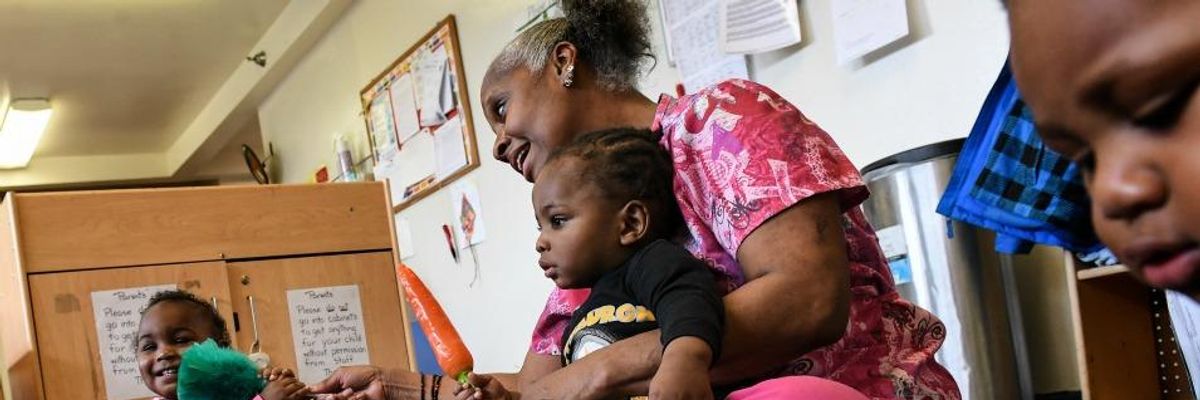One hundred economists called on federal lawmakers Monday to pass an immediate investment of $50 billion into the U.S. child care industry, writing that as with many aspects of the economy, the coronavirus pandemic has illustrated the precarious nature in which child care centers operate.
The pandemic "deepened structural problems" within the child care landscape, the experts wrote, including a pay scale so low that half of child care workers already rely on some form of public assistance and the ongoing existence of "child care deserts" facing more than half of American families.
"We are at a pivotal moment in which policymakers can make lasting, necessary changes to the child care system to reduce long-standing economic inequities," wrote the economists. "We believe that an effective government response to the child care crisis will play a vital role in the reopening of workplaces and the ability of parents to participate in an equitable recovery."
The letter was signed by economists including Stephanie Kelton, who advised Sen. Bernie Sanders (I-Vt.) on his presidential campaign and is now on a joint economic task force formed by Sanders and presumptive Democratic nominee Joe Biden; Jason Furman, former chair of President Barack Obama's Council of Economic Advisors; and UMass Amherst Professor Arindrajit Dube.
"During this acute crisis, policymakers should come together around the shared goal of supporting working parents, ensuring the health and safety of child care workers, and rebuilding a fair and just child care system for our children and our economy."
--100 U.S. economists
According to a first-of-its-kind analysis by the University of Minnesota and the Center for American Progress (CAP) also released Monday, rural families, Latino communities, and people living in middle-income areas where the average household earns $75,000 to $85,000 per year are most likely to live in child care deserts, where open child care slots are not keeping up with need.
The researchers compared the number of families with children under age 5 in an area to licensed child care providers within a 20-minute drive.
The university and CAP joined the economists in calling for a federal investment in child care to help the entire industry, warning that half of the country's child care centers are at risk of closing, particularly in areas where families were already struggling before the pandemic.
"Without a significant public investment in a dedicated child care stabilization fund, child care closures will be concentrated in low-income and middle-income neighborhoods and many families will be unable to access child care assistance during a period of record-high unemployment," reads the study. "This could, in turn, make the reopening of the broader economy smoother in areas with adequate child care supply while businesses whose employees live in child care deserts may struggle to get parents back to work."
More than half of the country's child care centers shut down temporarily when the coronavirus outbreak became a pandemic in March, and a third of them reported they would not be able to survive more than a two-week closure. By April, child care workers were hard-hit by the nation's skyrocketing unemployment numbers, with one in three out of work.
A stopgap investment of at least $50 billion--or $9.6 billion per month for six months through the Child Care and Development Block Grant--would "stabilize the child care industry, save child care businesses from permanent closure, and prevent an even greater shortage of child care going forward," wrote the economists in their open letter.
"During this acute crisis, policymakers should come together around the shared goal of supporting working parents, ensuring the health and safety of child care workers, and rebuilding a fair and just child care system for our children and our economy," they added.
The letter and CAP's study comes weeks after Rep. Rosa DeLauro (D-Conn.) introduced the Child Care Is Essential Act, which also calls for $50 billion within the block grant program. The program exists within the Health and Human Services Department and, before the pandemic, provided states and indigenous tribes with child care funds specifically for lower-income communities.
In the Senate, Sens. Elizabeth Warren (D-Mass.), Tina Smith (D-Minn.), and Kirsten Gillibrand (D-N.Y.) have also called for a $50 billion investment since the pandemic began.
The investment is urgently needed not only because of the direct aid it would provide to child care operators, the economists wrote, but also because it would allow millions of parents to return to the workforce.
"Child care is a critical piece of our economic infrastructure, just like roads and bridges, allowing parents to work if they choose," the economists wrote. "A major federal investment to stabilize child care programs will ensure greater parental employment, save roughly one hundred thousand small businesses, and contribute to a more efficient economic recovery."




